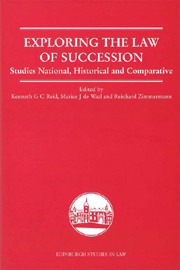Book contents
- Frontmatter
- Contents
- Preface
- List of Contributors
- List of Abbreviations
- Table of Cases
- 1 A Comparative Overview
- 2 Compulsory Heirship in Roman Law
- 3 Succession Law in Scotland – a Historical Perspective
- 4 Succession Law in South Africa – a Historical Perspective
- 5 Freedom of Testation and the Ageing Testator
- 6 Testamentary Conditions and Public Policy
- 7 Forfeiture Clauses and Events in Scots Law
- 8 Revocation of Wills by Changed Circumstances
- 9 Fideicommissary Substitutions: Scots Law in Historical and Comparative Perspective
- 10 The conditio si institutus sine liberis decesserit in Scots and South African Law
- 11 The New Dutch Law of Succession
- 12 Revocability of Mutual Wills
- 13 Succession Agreements in South African and Scots Law
- Index
7 - Forfeiture Clauses and Events in Scots Law
Published online by Cambridge University Press: 12 September 2012
- Frontmatter
- Contents
- Preface
- List of Contributors
- List of Abbreviations
- Table of Cases
- 1 A Comparative Overview
- 2 Compulsory Heirship in Roman Law
- 3 Succession Law in Scotland – a Historical Perspective
- 4 Succession Law in South Africa – a Historical Perspective
- 5 Freedom of Testation and the Ageing Testator
- 6 Testamentary Conditions and Public Policy
- 7 Forfeiture Clauses and Events in Scots Law
- 8 Revocation of Wills by Changed Circumstances
- 9 Fideicommissary Substitutions: Scots Law in Historical and Comparative Perspective
- 10 The conditio si institutus sine liberis decesserit in Scots and South African Law
- 11 The New Dutch Law of Succession
- 12 Revocability of Mutual Wills
- 13 Succession Agreements in South African and Scots Law
- Index
Summary
INTRODUCTION
Forfeiture clauses and events leading to disinheritance or the forfeiture of bequests are well known in the field of succession as the means by which entitlements are forfeited in accordance with the express provision of the testator or by law. This chapter examines the nature of these forfeiture clauses and forfeiture events in Scots law. As forfeiture has limited application to the rights of executors, it will address forfeiture only in relation to beneficiaries' rights.
THE RIGHTS PASSING
To understand forfeiture one requires an appreciation of the rights arising and passing on death and a familiarity with the law of vesting and the nature of an executor. Upon these matters the authorities are obscure because the study of the law of succession has for too long been divorced from the general law of property. For assistance one may refer to basic principles, although there remains a debate as to their precise application. For this chapter the following brief and, of necessity, over-simplified overview of the modern law will have to suffice.
The deceased's estate may contain both real and personal rights. There are conceptual difficulties with the idea that personal rights can be incorporeal things capable of ownership, but acceptance of this assists analysis of the transfer of the deceased's estate to the beneficiaries. The purpose of the law of succession is to effect a conveyance of the items in the deceased's estate to the relevant beneficiaries so that they are wholly distributed.
- Type
- Chapter
- Information
- Exploring the Law of SuccessionStudies National Historical and Comparative, pp. 114 - 140Publisher: Edinburgh University PressPrint publication year: 2007

